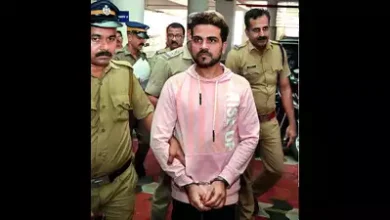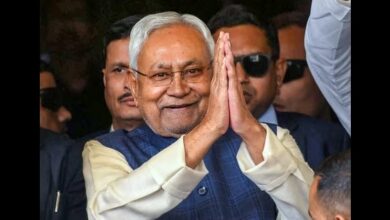How Bihar’s caste survey aims to continue Karpoori Thakur’s legacy
Karpoori Thakur, the son of a small-scale farmer from the Nai (barber) clan, traveled great distances to hold the office of chief minister of Bihar twice in the 1970s. Thanks to his efforts, particularly for the underprivileged elements of society, he would earn the title of Jannayak, or “people’s hero.” Due to his popularity and support for social justice, Thakur, who was imprisoned during the Quit India Movement against the British colonialists, never lost an election since winning it the first time in 1952.
When there was little political room for the backward castes in state politics, Thakur, whose group made up only 1.6% of the population in the 1970s, was the first to mobilize them. In November 1978, he opened the path for them to get 26% of the available government jobs in Bihar. He was the first communist to see the necessity to identify and elevate the most underprivileged members of the backward classes on their own.
Thakur was the first to advocate for the advancement of the underprivileged, which eventually laid the stage for the Mandal Commission’s proposals for OBC quota in the 1990s.
The adoption transformed OBCs into a significant political force and inspired the creation of regional parties, particularly Bihar’s governing Janata Dal (United) or JD(U) and the Rashtriya Janata Dal, which transformed heartland politics.
Since the 1990s, Lalu Prasad Yadav, the leader of the RJD, and Nitish Kumar, the chief minister of the JD(U), have both profited on the Karpoori heritage to keep control of the situation in the hands of the lower classes.
They attempted to strengthen their position by releasing the caste survey findings on Monday after finishing an exercise that may possibly upend heartland politics and bring caste to the forefront of the conversation before the 2024 presidential elections.
Another political upheaval, which many referred to as the second Mandal moment, was anticipated as a result of the exercise. To challenge the Bharatiya Janata Party’s mobilization of less-dominant backward and Dalit communities under a larger Hindu umbrella, the opposition Indian National Developmental Inclusive Alliance, which comprises RJD and JD(U), has campaigned for a national caste census. In order to dispel a previous misconception that the party was exclusively focused on its traditional voter base, higher castes, the BJP has enlisted marginalized caste leaders into its ranks.
According to poll results, Bihar’s governing coalition was anticipated to advocate for increasing the percentage of employment and educational seats reserved for members of lower castes according to their numbers. For the first time since Independence, a physical government headcount was conducted as part of the historic census, which revealed that over two-thirds of Bihar’s population belongs to backward groups. Only the Scheduled Castes (SC) and Scheduled Tribes (ST) are counted in India’s annual census.
According to the poll, extremely backward groups (ECB), which include 112 castes, make up 36.01 percent of the population, while backward castes (30 communities) account for another 27.12 percent. The combined percentage of the state’s EBCs and backward castes, known as other OBC, is 63.13%. ST make up 1.68% and SC 19.65%.
In order to defeat friend-turned-foe-turned-ally Lalu Prasad Yadav, Kumar adopted Thakur’s classification system, which divided backward groups into two categories. Thakur was also Bihar’s first non-Congress chief minister. To counteract the impact of former Union minister Ram Vilas Paswan, he developed Mahadalits using the same concept.
The Mungeri Lal Commission suggested that backward classes be categorized as very backward classes (including weaker sections of Muslims) and backward classes when its report was presented in 1977, while Thakur was the chief minister. In 1978, the report was put into practice.
The first chief minister of Bihar, Sri Krishna Sinha, established two categories for backward castes eligible for scholarships.
Yashwant Sinha, a former Union minister who worked as Thakur’s personal secretary, said that Thakur played a significant role in the emergence of backward politics. When he had the chance to be in power, Thakur, he said, did his part for their wellbeing outside of politics in a genuine manner. “However, history shows that if people believe too strongly that a reservation alone may result in electoral gains, they may be in for a shock. Thakur did a lot for the underprivileged, including those who he thought were excluded from receiving benefits from welfare programs and reservations. The predominant castes of the underclass gained greatly. In order for the benefits to reach the highly underprivileged classes in the proper proportion, he separated them into a distinct category.
Added Sinha Thakur quickly lost control. The late former prime minister VP Singh experienced the same scenario, and he lost shortly after the Mandal Commission report was put into effect.
According to Sinha, the caste census indicates that just 15% of the population falls into the general group. “I believe it is time to reevaluate. Reserve 15% of the tickets for the general category and leave the remaining seats for others. After all, it would be difficult to fulfill the expectations of everyone with so many castes rising. Reservation shouldn’t be seen as a certain election winning strategy. Because of the decline in government employment, it is unable to meet public expectations. It will be necessary to increase employment possibilities in government.
Prior to Thakur, higher castes mostly controlled state politics, according to DM Diwakar, a former director of the AN Sinha Institute of Social Studies. According to him, Thakur was brave and tactful in achieving what was thought to be unlikely at the time—emerging as the backward castes’ consensus choice after the Mungeri Lal Commission report, which served as a precursor to the Mandal Commission.
“The government adopted the quota for backward classes in the government employment in 1978 after the Mungeri Lal Commission report recognized 127 castes. But shortly later, his regime was overthrown. He withdrew English as a required subject at the matriculation level as the education minister long before that to ensure that the educationally disadvantaged did not suffer and sought further education. Karpoori was a guy who advocated for the underprivileged, particularly for those at the bottom of the social hierarchy.
Thakur, he said, was a devoted socialist who contributed significantly to Bihar politics for more than 40 years. “The Karpoori legacy has also influenced Bihar politics since 1990.”
As the caste census revealed the true numerical strength of caste groupings, which may produce a new set of leaders and provide difficulties for the existing leadership, he said that the effect of the study will be apparent in the months to come. “There is still a ton more data to come. Everyone was aware of what was to come. Over 60% of the population belonged to the lower castes, which was recognized even during the reign of Karpoori.







